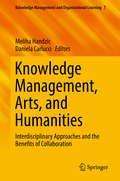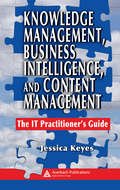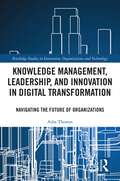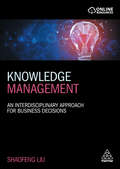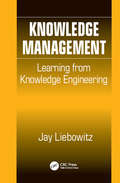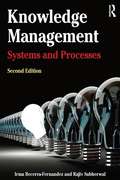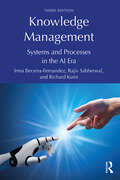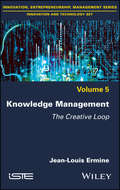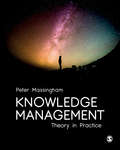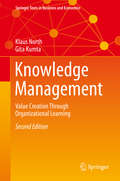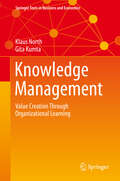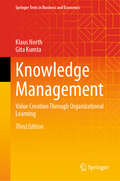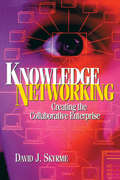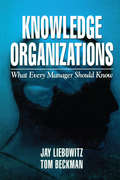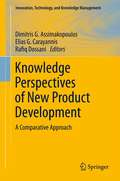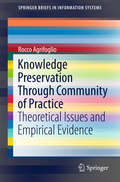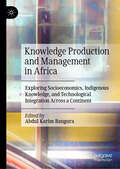- Table View
- List View
Knowledge Management in the Pharmaceutical Industry: Enhancing Research, Development and Manufacturing Performance
by Elisabeth Goodman John RiddellThe Pharmaceutical Industry has been undergoing a major transformation since the heady days of 'big pharma' in the 1970s and 80s. Patent expiry, the rise of generics, and the decline of the blockbuster drug have all changed the landscape over the last 10-15 years. It's an environment where products can take 10 years or more to come to market, billions are spent on research and development, jobs are being shed in the western pharma homelands and regulators and the public are more demanding than ever. So what part is Knowledge Management playing and going to play in this vital international industry? Knowledge Management (KM) has many facets from providing comprehensive knowledge bases for workers, through the sharing of advice and problem solving, to providing an environment for innovation and change. This book, focusing on research and development, and manufacturing-based companies, explores how a range of techniques and approaches have been applied in the unique environment of the Pharmaceutical Industry, and examine how it can help the industry in the 21st century. Whilst the book is centered on the Pharmaceutical Industry, its objective will be to discuss and demonstrate how Knowledge Management can be applied in a variety of environments, and with a range of cultural issues. KM practitioners, and potential practitioners, both within and outside the Pharmaceutical Industry, will be able to gain valuable guidance and advice from both the examples of good practice and the lessons learned by the authors and contributors.
Knowledge Management in the Public Sector: A Blueprint for Innovation in Government
by David E McNabbThis comprehensive text introduces public management students and government and nonprofit administrators to the principles and practices of Knowledge Management. The first book to focus exclusively on knowledge management techniques in government agencies, it covers such important concepts as collecting, categorizing, processing, distributing, and archiving critical organization data and information - and then converting and disseminating these resources to all who need to share in the organizational knowledge. Written in an easy-to-read, non-technical style, the book includes a thorough review of the current literature in the field as well as a comprehensive presentation of Knowledge Management techniques. Extensive illustrations, models, checklists, and instructions lead readers through the steps involved in instituting KM programs in government and non-profit agencies.
Knowledge Management, Arts, and Humanities: Interdisciplinary Approaches and the Benefits of Collaboration (Knowledge Management and Organizational Learning #7)
by Meliha Handzic Daniela CarlucciThis book presents a series of studies that demonstrate the value of interactions between knowledge management with the arts and humanities. The carefully compiled chapters show, on the one hand, how traditional methods from the arts and humanities – e.g. theatrical improvisation, clay modelling, theory of aesthetics – can be used to enhance knowledge creation and evolution. On the other, the chapters discuss knowledge management models and practices such as virtual knowledge space (BA) design, social networking and knowledge sharing, data mining and knowledge discovery tools. The book also demonstrates how these practices can yield valuable benefits in terms of organizing and analyzing big arts and humanities data in a digital environment.
Knowledge Management, Business Intelligence, and Content Management: The IT Practitioner's Guide
by Jessica KeyesKnowledge management (KM) is the identification and analysis of available and required knowledge, and the subsequent planning and control of actions, to develop "knowledge assets" that enable businesses to generate profits and improve their competitive positions. This volume provides the framework for the strategic use of the information intelligen
Knowledge Management, Leadership, and Innovation in Digital Transformation: Navigating the Future of Organizations (Routledge Studies in Innovation, Organizations and Technology)
by Asha ThomasDigital technologies have created an opportunity to bring together knowledge management, leadership, and innovation. Any business that wishes to thrive in today's competitive digital landscape must prioritize knowledge management. Leadership in the digital era is about leveraging digital tools to manage knowledge to attain a strategic advantage effectively. Thus, leadership is an essential and central element for knowledge creation, acquisition, utilization, and integration. As a result, this book will focus on knowledge management, leadership, and innovation, all intertwined but not covered in existing research. The book integrates knowledge management, leadership, and innovation into a unified framework in the era of digitization, exploring the benefits knowledge management can bring to organizations adapting to new digital requirements in a dynamic environment. It presents both theoretical and empirical research to synthesize these distinct disciplines in a cohesive body of work. The resulting model will create a useful framework to be applied to future research and further add to practical and theoretical implications. The book is primarily written for scholars, researchers, and advanced students with an interest in the three disciplines and associated fields.
Knowledge Management: An Evolutionary View (Advances In Management Information Systems Ser.)
by Irma Becerra-Fernandez D. E Leidner Dorothy LeidnerThis book serves as a complete introduction to the subject of Knowledge Management (KM), and incorporates technical as well as social aspects, concepts as well as practical examples, and traditional KM approaches as well as emerging topics. Knowledge Management: Systems and Processes enhances the conventional exposition of KM with an in-depth discussion of the technologies used to facilitate the management of knowledge in large and small organizations. This includes a complete description of the theory and applications of the various techniques and technologies currently in use to manage organizational knowledge. The discussion of technology is at a level appropriate for the typical business administration graduate student or corporate manager. Special features:* Includes case studies of actual implementations of KM systems, including details such as system architecture * Contains numerous vignettes describing practical applications of KM initiatives at leading firms and governmental organizations * Provides a balanced view of knowledge management, while incorporating benefits and controversial issues, and both technology and social aspects * Extremely current, making extensive use of latest developments in, and examples from, the field of KM * Written by two proficient and recognized researchers in the field of KM.
Knowledge Management: An Interdisciplinary Approach for Business Decisions (Lecture Notes In Business Information Processing Ser. #221)
by Shaofeng LiuAs knowledge economies become increasingly important around the world, it is essential that organizations are able to transform their knowledge into a competitive advantage. This textbook offers an interdisciplinary approach to knowledge management written specifically for postgraduate students in business and management schools. Knowledge Management presents classic and advanced concepts, models and frameworks using a clear logical structure, which covers building knowledge competence, the knowledge lifecycle, and integration of knowledge management with business decision making. An overall framework illustrates links between chapters and ensures readers can gain a body of actionable knowledge rather than learning isolated, uncontextualized topics.Based on cutting-edge research findings and covering the most advanced IT and IS technologies, this book emphasises the need for knowledge management to span boundaries across organizations, supply chains and partnerships, rather than being limited to individual learning and sharing within businesses. Knowledge Management is international in scope and includes real world case studies and role play scenarios to show how theories are applied in practice, and "think back" and "critique discussion" questions to encourage reflective learning and critical thinking. This indispensable text provides a dynamic picture of the evolution of knowledge management and demonstrates its full potential to enable better business decisions. Accompanying online resources include PowerPoint slides for lecturers and exercise questions for students.
Knowledge Management: Dependency, Creation and Loss in Industrial History (Routledge Focus on Industrial History)
by Ian Jones John F. Wilson Steven TomsThis shortform book presents key peer-reviewed research selected by expert series editors and contextualised by new analysis from each author on the subject of knowledge management in industrial history. With contributions on knowledge management, knowledge transfer, knowledge loss, knowledge creation, competition and co-operation in producing skilled employees, and ownership structures and their relation to knowledge management, this volume provides an array of fascinating insights into industrial history. Of interest to business and economic historians, this shortform book also provides analysis and illustrative case-studies that will be valuable reading across the social sciences.
Knowledge Management: Learning from Knowledge Engineering
by Jay LiebowitzKnowledge Management (KM) is strongly rooted in the discipline of Knowledge Engineering (KE), which in turn grew partly out of the artificial intelligence field. Despite their close relationship, however, many KM specialists have failed to fully recognize the synergy or acknowledge the power that KE methodologies, techniques, and tools hold for enh
Knowledge Management: Systems and Processes
by Irma Becerra-Fernandez Rajiv SabherwalThis text serves as a complete introduction to the subject of knowledge management, incorporating technical, and social aspects of knowledge management, as well as practical examples, traditional approaches, and emerging topics.
Knowledge Management: Systems and Processes in the AI Era
by Irma Becerra-Fernandez Rajiv Sabherwal Richard KumiKnowledge Management: Systems and Processes in the AI Era, Third Edition, is aimed at students and managers who seek detailed insights into contemporary knowledge management (KM). It explains the concepts, theories, and technologies that provide the foundation for knowledge management; the systems and structures that constitute KM solutions; and the processes for developing, deploying, and evaluating these KM solutions. This book serves as a complete introduction to the subject of knowledge management, incorporating technical and social aspects, as well as concepts, practical examples, traditional KM approaches, and emerging topics. This third edition has been revised and expanded to include more coverage of emergent trends such as cloud computing, online communities, crowdsourcing, and artificial intelligence. Aimed at advanced undergraduate, postgraduate, and MBA students who are seeking a comprehensive perspective on knowledge management, Knowledge Management is also complemented by online support for lecturers including suggested solutions to the many review questions and application exercises contained within the book.
Knowledge Management: The Creative Loop
by Jean-Louis ErmineKnowledge Management: The Creative Loop by Jean-Louis Ermine
Knowledge Management: Theory in Practice
by Peter MassinghamAn overview of what knowledge management is, the theoretical basis behind it, and practical insights into how it can be implemented effectively in a professional setting. Starting with a discussion of how knowledge management has evolved, how it adds value for organisations, and how it's success can be measured. The book then covers best practice and the key activities associated with doing knowledge management, including knowledge strategy, managing knowledge loss and knowledge sharing. Finishing with a discussion of knowledge management’s role in international business and what future developments are expected in the field. Practical insights are drawn from around the world, with case studies such as how NASA forgot how to send a man to the Moon, Acer: The smiling Asian tiger, and why Saudi Arabia’s experts do not learn from overseas experts. The book is supported by online resources for lecturers and students, including PowerPoint slides, an instructor’s manual, access to SAGE journal articles, and scorecards for measuring usefulness of knowledge management tools. Suitable reading for undergraduate and postgraduate business and management students on knowledge management & organizational learning modules.
Knowledge Management: Theory in Practice
by Peter MassinghamAn overview of what knowledge management is, the theoretical basis behind it, and practical insights into how it can be implemented effectively in a professional setting. Starting with a discussion of how knowledge management has evolved, how it adds value for organisations, and how it's success can be measured. The book then covers best practice and the key activities associated with doing knowledge management, including knowledge strategy, managing knowledge loss and knowledge sharing. Finishing with a discussion of knowledge management’s role in international business and what future developments are expected in the field. Practical insights are drawn from around the world, with case studies such as how NASA forgot how to send a man to the Moon, Acer: The smiling Asian tiger, and why Saudi Arabia’s experts do not learn from overseas experts. The book is supported by online resources for lecturers and students, including PowerPoint slides, an instructor’s manual, access to SAGE journal articles, and scorecards for measuring usefulness of knowledge management tools. Suitable reading for undergraduate and postgraduate business and management students on knowledge management & organizational learning modules.
Knowledge Management: Value Creation Through Organizational Learning (Springer Texts in Business and Economics)
by Klaus North Gita KumtaThis textbook on knowledge management draws on the authors’ more than twenty years of research, teaching and consulting experience. The first edition of this book brought together European, Asian and American perspectives on knowledge-based value creation; this second edition features substantial updates to all chapters, reflecting the implications of the digital transformation on knowledge work and knowledge management. It also addresses three new topics: the impact of knowledge management practices on performance; knowledge management in the public sector; and an introduction to ISO 9001:2015 as an implementation framework.The book is intended not only for academic education but also as an essential guide for managers, consultants, trainers, coaches, and all those engaged in business, public administration or non-profit work who are interested in learning about organizations in a knowledge economy. Given its wealth of case studies, examples, questions, exercises and easy-to-use knowledge management tools, it offers a true compendium for learning about and implementing knowledge management initiatives.
Knowledge Management: Value Creation Through Organizational Learning (Springer Texts in Business and Economics)
by Klaus North Gita KumtaThis textbook on Knowledge Management is a result of more than twenty years of research, teaching and consulting experience of the authors. This is the first comprehensive text which brings together European, Asian and American perspectives on knowledge-based value creation. This book is intended not only for academic education but also for providing guidance to managers, consultants, trainers, coaches and those interested to learn about organizations in a knowledge economy in business, public administration and non-profit organizations. Many case studies, examples, questions, assignments as well as easy to use knowledge management tools make this work a compendium for learning, and for implementing knowledge management initiatives.
Knowledge Management: Value Creation Through Organizational Learning (Springer Texts in Business and Economics)
by Klaus North Gita KumtaThis textbook on knowledge management draws on the authors&’ more than thirty years of research, teaching, and consulting experience. The first edition of this book brought together European, Asian, and American perspectives on knowledge-based value creation; The second edition included digital transformation's impact on knowledge work and management. This third edition features substantial updates to all chapters, reflecting the implications of digital technology on knowledge work and knowledge management with special reference to Artificial Intelligence. In particular, it addresses three new topics: blending human and machine intelligence, critical thinking, and ethical use of knowledge, and managing knowledge for sustainable development. The book is intended not only for academic education but also as an essential guide for managers, consultants, trainers, coaches, and all those engaged in business, public administration, or non-profit work who are interested in learning about organizations in a knowledge economy. Given its wealth of case studies, examples, questions, exercises, and easy-to-use knowledge management tools, it offers a true compendium for understanding and implementing knowledge management initiatives.
Knowledge Networking: Creating The Collaborative Enterprise
by David SkyrmeKnowledge Networking explains the strategic, organizational and human impact of technologies that support knowledge: the internet, groupware, collaborative technologies. It shows how they can transform organizational practices and help to improve both individual and team performances. Based on proven experience and includes customised toolkits, cases and action plans. From pooling expertise on a sales bid via computer referencing, to improving customer service using the flexible office, the author demonstrates how potential can become practice.Knowledge management is the big management idea currently influencing organizations, and Knowledge Networking explores the global impact of sharing knowledge and expertise. It is a highly practical text which includes customised toolkits, cases and action plans to enable individuals and teams to improve their performance.
Knowledge Networks and Tourism (Routledge Advances in Tourism)
by Roger Vaughan Michelle McLeodThe receipt of knowledge is a key ingredient by which the tourism sector can adjust and adapt to its dynamic environment. However although its importance has long been recognised the fragmentation within the sector, largely as a result of it being comprised of small and medium sized businesses, makes understanding knowledge management challenging. This book applies knowledge management and social network theories to the business of tourism to shed light on successful operations of tourism knowledge networks. It contributes specifically to understanding a network perspective of the tourism sector, the information needs of tourism businesses, social network dynamics of tourism business operation, knowledge flows within the tourism sector and the transformation of the tourism sector through knowledge networks. Social Network Analysis is applied to fully explore the growth and maintenance of tourism knowledge networks and the relationships between tourism sector stakeholders in relation to their knowledge requirements. Knowledge Networks and Tourism will be valuable reading for all those interested in successful operations of tourism knowledge networks.
Knowledge Organizations: What Every Manager Should Know
by Jay Liebowitz Thomas J. BeckmanFor knowledge management to be successful, the corporate culture needs to be adapted to encourage the creation, sharing, and distribution of knowledge within the organization. Knowledge Organizations: What Every Manager Should Know provides insight into how organizations can best accomplish this goal. Liebowitz and Beckman provide the information companies need for evaluating and planning the steps and processes that will transform their existing organization infrastructure into a "knowledge-based" organization. This easy-to-read guide includes many vignettes, examples, and short cases of organizations involved in knowledge management.
Knowledge Perspectives of New Product Development
by Elias G. Carayannis Dimitris G Assimakopoulos Rafiq DossaniNew Product Development (NPD) is about the ideation, formulation, and implementation of new and superior solutions in the market. Beyond the obvious need for organizations to innovate in order to compete, embedded in any NPD program are knowledge, technological expertise, and the social networks that convert these capabilities into offerings that create value at every level--for customers, industries, communities, and regions. This volume provides an array of knowledge perspective in NPD across multiple levels of analysis and geographic regions, including Europe, the United States, China, Japan, and India, to explore the dynamics of NPD in today's global environment. Presenting case studies from such industries as ICT services, semiconductors, software development, bio-technology, higher education, and even safety for children's toys, and drawing from a variety of theoretical perspectives, including technology and knowledge management, sociology, economic geography, and organizational behavior, the authors highlight critical success and failure factors in NPD. Among the topics covered: New product development teams, including multi-functional and multi-site teamsDe-localization and off-shoring of tasks and processesIndividual competencies and organizational capabilitiesUniversity-industry interactions, high-tech clusters, and technology transfer Technology policy
Knowledge Preservation Through Community of Practice
by Rocco AgrifoglioThis book links knowledge management literature and information systems research to explore the process of knowledge preservation within a community of practice. It contributes to existing literature in different ways. First, it provides a conceptualization of the "community knowledge preservation" process. In contrast to previous knowledge management research, knowledge preservation is thus viewed as a process in its own right rather than an integral part of knowledge creation and sharing. Furthermore, the book also investigates how communities of practice preserve knowledge, by identifying the main mechanisms and tools enabling members to select, store and actualize the explicit and tacit forms of collective knowledge. More in general, the book presents guidance on how to use communities of practice to ensure the preservation of knowledge in development processes, for individuals and organizations alike.
Knowledge Production Modes between Science and Applications 1: Concepts
by Jean-Claude AndréInventing isn’t easy! In this book, twelve “valleys of death” are identified which, following a linear approach, correspond to the various obstacles that limit the various passages from an original idea to invention, and then to industrial innovation. These various limiting factors have a variety of origins: disciplined scientific training, weak general and scientific culture, New Public Management, hierarchical support, funding, evaluation, proof of concepts, complexity management, and heuristic and interdisciplinary approaches on the one hand, and attractiveness for the new on the other. After an idea is formulated, these contexts bring small elements of science into play, but above all human aspects ranging from motivation and the quality of exchanges to responsibility. In short, it is a possible dynamic way of living together to promote innovations stemming from science. This is not easy, but if the invention is profitable for society, the downstream sector can greatly facilitate the various stages of commercialization.
Knowledge Production Modes between Science and Applications 2: Applications
by Jean-Claude AndreInventing isn’t easy! After identifying and presenting the 12 "valleys of death", the real obstacles limiting the transition from an original idea to an innovative one, including the notion of socially responsible research, Knowledge Production Modes between Science and Applications 2 applies the concepts introduced in Volume 1. The book starts off with 3D printing, which has essentially broken through all barriers by offering remarkable advantages over existing mechanical technology. The situation is different for 4D printing and bio-printing. First of all, we need to tackle the complexity inherent in these processes, and move away from disciplinarity to find robust, applicable solutions, despite the obstacles. This is possible in niche areas, but currently, low profitability still limits their general applicability and the willingness of researchers to embrace interdisciplinary convergence....
Knowledge Production and Management in Africa: Exploring Socioeconomics, Indigenous Knowledge, and Technological Integration Across a Continent
by Abdul Karim BanguraThis contributed volume explores knowledge production and management across diverse African contexts, integrating indigenous perspectives with modern technological advancements. It addresses the intersection of cultural, socioeconomic, and technological factors, offering readers a thorough understanding of how these elements shape knowledge systems in Africa. Structured into five key sections—technology, pedagogy and curricula, business and ecology, culture and community, and human relationships—the book presents a cohesive framework guiding readers through various domains of knowledge production. Each chapter examines specific themes, from AI&’s moral standing and mobile technologies in agriculture to digital transformation in education and the role of performing arts in cultural orientation. The chapters are authored by experts who provide empirical research, case studies, and theoretical analyses, ensuring a rich and diverse exploration of topics. By challenging conventional paradigms and advocating for context-specific approaches, the book highlights the resilience and innovation inherent in African knowledge practices. Readers will gain a deep understanding of the multifaceted nature of knowledge production in Africa. The book highlights culturally-responsive cognitive schemas, the impact of digital technologies on education and business, and the role of indigenous knowledge in sustainable development. Readers will walk away from the book understanding inclusive and effective knowledge management practices, and they will have an enhanced appreciation for the unique contributions of African knowledge systems to global discourses.


